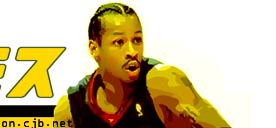





| Iverson: Man with plan, and the MVP |
|---|
|
EVEN AT 21, as the somewhat combative, wary No. 1 overall pick in the NBA draft in 1996, Allen Iverson had a plan, one he shared with only a select few. Where he wanted to be in five years. In 10. He could not have been sure how he was going to get there, only that he was going to get there. Earlier, it had been a dream, one he had spoken incessantly about with his mother, Ann, resting on her bed in their home in Hampton, Va., when both were very young and times were very bleak. He's there. He's the NBA's Most Valuable Player, dominating the balloting by an international panel of sports writers and broadcasters, receiving 93 of a possible 124 first-place votes and 1,121 points. He finished far ahead of San Antonio's Tim Duncan (18 first-place votes, 706 points), the Los Angeles Lakers' Shaquille O'Neal (seven, 578) and Sacramento's Chris Webber (five, 521). Whatever the plan was, the 6-foot, 165-pound Iverson, already the league's leading scorer and All-Star Game MVP, became the shortest and lightest MVP in history. He stepped ahead of Boston's Bob Cousy, who won in 1957 at 6-1, 175. The only player named on every ballot, Iverson is the first Sixers winner since Moses Malone in 1982-83. He is also the first player since Chicago's Michael Jordan in '92-93 to lead the league in scoring (31.1) and steals per game (2.51). What we know about the plan is, Iverson did it without sacrificing his relationships with his family or his loyalty to his friends. He did it by steadfastly refusing to give in to injuries, circumstances or wrenching jaw-to-jaw battles with Larry Brown - his coach the last four seasons with the 76ers - that threatened to rip both their careers apart. "I think this is exactly what he had planned for himself five years ago," said Henry "Que" Gaskins, one of Iverson's advisers. "I remember us talking about his five- and 10-year plans, how he wanted to be at this point. It's kind of unbelievable that it actually came true." Think about this: How many times have you heard marquee players - most recently Webber - say they want to go to a team that has a chance to win a championship? And how many times have you heard Iverson say exactly the opposite, that he wants to stay and help his team do that? Last summer, in the aftermath of a tumultuous season in which he refused to regularly be on time for practice, shootarounds and other team functions, when he was nearly sent to the Detroit Pistons in what have been an explosive four-team trade that would have included more than 20 players, something clicked. "I think two straight years of making it to the second round of the playoffs and getting eliminated, the threat of being traded made a difference," Gaskins said. "That, and knowing none of it had to do with his ability on the court. This was him wanting people to believe he was a winner. I don't think he liked the idea that there were fans that thought of him as selfish, as not a team player, things he felt he had been all his life." The Sixers climbed from 49 victories to 56, becoming the No. 1 playoff seed in the East for the first time since 1982-83, when they last won a championship. They eliminated the Pacers from the best-of-five first round in four games and are locked in a 2-2 struggle with Toronto in the best-of-seven second round that continues tonight at the First Union Center. President Pat Croce called the development since '96-97, "joys and agida, cheers and tears. . .from worst to first." "I didn't give up like a lot of people I've seen in my life give up where I'm from," Iverson said yesterday, fidgeting happily at a lectern in the ballroom of the Adam's Mark Hotel, a long jump shot down the street from the team's practice facility at Philadelphia College of Osteopathic Medicine. "We went through hell [last] summer; it showed a lot about coach Brown and myself. For one time in my career, I just sat back and listened and tried to understand somebody else for a change, and he did it the same way instead of arm-wrestling with me all the time. "I told him I wanted the same relationship as Phil Jackson and Michael Jordan [with the Bulls]. It might not be the same relationship, but again it might be better at this point because now I can look in his eyes and he can look in my eyes and we see the same thing." The same Allen Iverson who used to blow off practice or show up late for a charter flight or grumble about a coaching decision is suddenly the voice of authority in team meetings, is at the forefront of everything that is vital and dynamic about what was - as recently as '96-97 - a dead franchise. "I think the student's taught the teacher a lot about life, and I'm really grateful for that," Brown said. Iverson was proudest that "I did it my way." "I never changed who I was," he said. "I'm still the same person, I'm just smarter, I'm just older, I'm just more mature. . .I feel good about who I am as a person; I maintained who I am." The plan, Iverson and Brown know, is working. "He's not the MVP because he's the leading scorer in the league," the coach said. "If Allen Iverson can change and do it the right way, it sends a great message to everybody." "It's easy to get up here on the podium and say the right things," the MVP said, "but it's so hard to just do them." |

|
|---|
| Author |
| Phil Jasner |
| Source |
| Daily News |
| Return to Articles |